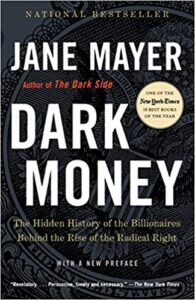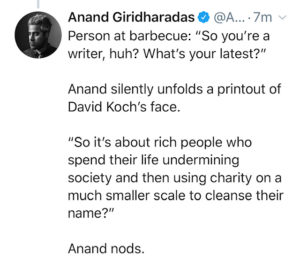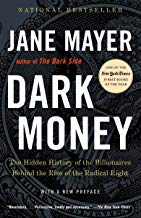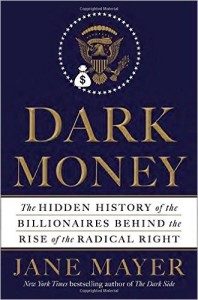Dark Money
#MUSTWATCH
October 13, 2020[U.S. Senator Sheldon Whitehouse, Rhode Island, during Judge Amy Coney Barrett’s nomination hearing to the Supreme Court.]
Grab a cup of tea…might need a cocktail. 28:37. Worth every minute. Brilliant. -Dayle
From New Yorker staff writer Jane Mayer and author of the book, Dark Money:
“Amazing exposition of the dark money behind the Supreme Court fight via Sen. Whitehouse.”
Dark Money:
In the politics of the united States, refers to political spending by nonprofit organizations — for example, 501(c)(4) (social welfare) 501(c)(5)(unions) and 501(c)(6) (trade association) groups — that are not required to disclose their donors. Such organizations can receive unlimited donations from corporations, individuals and unions. In this way, their donors can spend funds to influence elections, without voters knowing where the money came from. Dark money first entered politics with Buckley v. Valeo (1976) when the United States Supreme Court laid out Eight Magic Words that define the difference between electioneering and issue advocacy.
According to the Center for Responsive Politics (CRP), spending by organizations that do not disclose their donors has increased from less than $5.2 million in 2006 to well over $300 million in the 2012 presidential cycle and more than $174 million in the 2014 midterms.” The New York Times editorial board has opined that the 2014 midterm elections were influenced by “the greatest wave of secret, special-interest money ever raised in a congressional election.”CRP also noted that the 2010 landmark case, Citizens United v. FEC, marked the turning point when dark money contributions surged, stating “there are other groups now free to spend unrestricted funds advocating the election or defeat of candidates. These groups contend that they are not required to register with the FEC as any sort of PAC because their primary purpose is something other than electoral politics. This spending itself isn’t new. But the use of funds from a virtually unrestricted range of sources, including corporations, began with the most recent court rulings.” [wikipedia]
Darkest Money
August 26, 2019Today, August 26th, the U.S. president who called himself an environmentalist, addresses climate change:
“I feel that the United States has tremendous wealth. The wealth underneath its feet. I’m not gonna lose that wealth on dreams, on windmills, which frankly aren’t working too well.”
#DreamsAndWindmills
Jane Mayer [Staff Writer at The New Yorker/author of Dark Money]:
“Lee Fang, who was the first to report on the Kochs’ covert Tea Party role, argues that far more than appreciated, David Koch’s legacy includes electing Trump.”
DAVID KOCH’S MOST SIGNIFICANT LEGACY IS THE ELECTION OF DONALD TRUMP
Many obituaries published in recent days examine Koch’s history of polluting the environment and political system, how the donor network he helped lead mobilized opposition to addressing climate change, transformed our election laws to allow unlimited secret spending by the very rich, and systematically fought any regulation, labor reform, or tax viewed as a threat to the corporate power elite.
Yet Koch’s most visible accomplishment is the current occupant of the White House — a legacy largely unrecognized, and one that goes well beyond any other single triumph in his life.
https://theintercept.com/2019/08/26/david-koch-donald-trump/
What does $90 (B) buy?
March 12, 2016“Mayer is. . . [a] writer whose reporting can leave a reader breathless. . . . I urge you to read Dark Money.”
—Bill Moyers
“Jane Mayer’s Dark Money is utterly brilliant and chilling — no matter how much you think you already know. . . . Read it!”
—Naomi Klein, bestselling author of The Shock Doctrine: The Rise of Disaster Capitalism and This Changes Everything: Capitalism vs the Climate
“Jane Mayer’s Dark Money. . . is absolutely necessary reading for anyone who wants to make sense of our politics. Lay aside the endless punditry about Donald’s belligerence or Hillary’s ambition; Mayer is telling the epic story of America in our time.”
—The New York Review of Books
“Mayer believes that the Koch brothers and a small number of allied plutocrats have essentially hijacked American democracy, using their money not just to compete with their political adversaries, but to drown them out. . . . Dark Moneyemerges as an impressively reported and well-documented work. . . . ”
—From the cover of the Times Book Review
“Revelatory. . .persuasive, timely and necessary. . . . [O]nly the most thoroughly documented, compendious account could do justice to the Kochs’ bizarre and Byzantine family history and the scale and scope of their influence.”
—The New York Times
“[Dark Money] could inspire a more intense discussion about the impact of this wealthy conservative cadre on the Republican Party and the recent course of American politics.”
—Washington Post
“[B]ombshells explode in the pages of Dark Money, Jane Mayer’s indispensible new history . . . .combines her own research with the work of scores of other investigators, to describe how the Kochs and fellow billionaires like Richard Scaife have spent hundreds of millions to ‘move their political ideas from the fringe to the center of American political life.’”
—The Guardian
—
‘The network has brought together some of the richest people on the planet. Their core beliefs—that taxes are a form of tyranny; that government oversight of business is an assault on freedom—are sincerely held. But these beliefs also advance their personal and corporate interests: Many of their companies have run afoul of federal pollution, worker safety, securities, and tax laws.
The chief figures in the network are Charles and David Koch, whose father made his fortune in part by building oil refineries in Stalin’s Russia and Hitler’s Germany. The patriarch later was a founding member of the John Birch Society, whose politics were so radical it believed Dwight Eisenhower was a communist. The brothers were schooled in a political philosophy that asserted the only role of government is to provide security and to enforce property rights.
When libertarian ideas proved decidedly unpopular with voters, the Koch brothers and their allies chose another path. If they pooled their vast resources, they could fund an interlocking array of organizations that could work in tandem to influence and ultimately control academic institutions, think tanks, the courts, statehouses, Congress, and, they hoped, the presidency. Richard Mellon Scaife, the mercurial heir to banking and oil fortunes, had the brilliant insight that most of their political activities could be written off as tax-deductible “philanthropy.”
These organizations were given innocuous names such as Americans for Prosperity. Funding sources were hidden whenever possible. This process reached its apotheosis with the allegedly populist Tea Party movement, abetted mightily by the Citizens United decision—a case conceived of by legal advocates funded by the network.’ (From Amazon)



